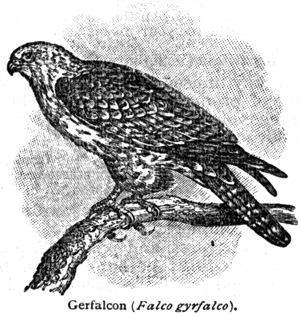Today’s word of the day is bevue, an inadvertent error or a small omission. It’s pronounced “beh-VIEW.” It’s from the French bévue, meaning “a blunder.”
Today’s word of the day is bevue, an inadvertent error or a small omission. It’s pronounced “beh-VIEW.” It’s from the French bévue, meaning “a blunder.”
Today’s word of the day is falx, something that is sickle-shaped, such as the poison fangs of a serpent, a metal implement (similar to a pruning hook), or, in anatomy, something which is falcate or falciform, both which mean “sickle-shaped” or “hooked.” Because of the bird’s sharp, hooked talons, falcon probably comes from the same root as falx.

Gerfalcon
Today’s word of the day is cacoethes, an irrational but irresistible motive for a belief or action. It is also spelled cacoëthes and it is pronounced /kahk-uh-EE-theez/. Cacoëthes loquendi is a mania for talking or a morbid desire for gossip or speechmaking. Cacoëthes scribendi is a morbid propensity for writing or an itch for authorship.
Today’s word of the day is ultroneous, meaning “spontaneous” or “voluntary,” and described by William Ballantyne Hodgson as “not recognised by Johnson, and little needed by the English tongue.” It’s from the same Latin root ultro- as ultromotivity, capability of spontaneous movement. Eleanor Agnes Moore has a deliciously dreadful poem titled “Ultroneus” in her Poems of Endowment on The Realities of Life:
While the influence is morally, physically and refining,
Yet by softening and cheering expressions made,
Intellect may be developed and the power of thought strengthened.
When the part of ultroneous is retained to be used at times.

Eleanor Agnes Moore
Today’s word of the day is preterist, a person who is largely interested only in the past. The root preter- is from the Latin praeter meaning “past” or “beyond.” Anyone who has studied grammar will recognize it in preterite, but it’s also found in preternatural ‘beyond what is normal or natural’ and preterhuman ‘beyond what is human.’
Today’s word of the day is spirituel, “having or evidencing a refined mind and wit.” The feminine form of the word—spirituelle—is defined even more fully: “characterized by or exhibiting a refined intellectuality, grace, or delicacy.” Both are French cognates of the English spiritual, which concerns the intangible nature and characteristics of humans.